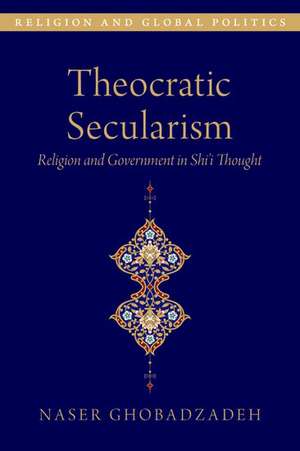Theocratic Secularism: Religion and Government in Shi'i Thought: RELIGION AND GLOBAL POLITICS SERIES
Autor Naser Ghobadzadehen Limba Engleză Hardback – 8 feb 2023
Preț: 582.12 lei
Preț vechi: 706.69 lei
-18% Nou
Puncte Express: 873
Preț estimativ în valută:
111.40€ • 115.88$ • 91.97£
111.40€ • 115.88$ • 91.97£
Carte disponibilă
Livrare economică 13-19 martie
Preluare comenzi: 021 569.72.76
Specificații
ISBN-13: 9780197606797
ISBN-10: 0197606792
Pagini: 320
Dimensiuni: 226 x 157 x 41 mm
Greutate: 0.59 kg
Editura: Oxford University Press
Colecția OUP USA
Seria RELIGION AND GLOBAL POLITICS SERIES
Locul publicării:New York, United States
ISBN-10: 0197606792
Pagini: 320
Dimensiuni: 226 x 157 x 41 mm
Greutate: 0.59 kg
Editura: Oxford University Press
Colecția OUP USA
Seria RELIGION AND GLOBAL POLITICS SERIES
Locul publicării:New York, United States
Recenzii
Naser Ghobadzadeh's reputation as one of the world's leading young scholars of Shiʼi Islam is reaffirmed by this enlightening and enlivening book. It shows with great clarity how the Iranian government's reigning doctrine of wilayat-i faqih was born of a revolutionary power grab that spurned the wisdom of ancient Shiʼi jurists—scholars such as Shaykh alMufid and al-Sharif al-Murtada who taught that people of faith who believe in the hidden Imam are obliged to shun involvement in earthly government and resist its corrupting and potentially evil effects.
This is a superb contribution to transformative scholarship in the Islamic Imami Shiʼa tradition, insightful and innovative yet authoritative, respectful, and well documented.
In Theocratic Secularism, Ghobadzadeh proposes that Twelver Shiʼism has occasioned a religious justification for political secularism. In doing so he details a history of Shiʼism from its formative period to the present, placing what he calls 'governmental Shiʼism' against 'Shiʼi orthodoxy.' One need not be convinced of his argument to see a solid scholar at work trying to question the religious foundation of tyrannical rule of a clerical class.
Ghobadzadeh has meticulously probed the history of Shiʼite tradition to underscore the idea that 'theocratic secularism' is embedded in the Twelver Shiʼi theology. The book traverses painstakingly through Iranian and Western sources to demonstrate that Islamic government is a modern construct, and it is inconceivable for it to exist legitimately during the occultation of the Twelfth Imam.
This is a superb contribution to transformative scholarship in the Islamic Imami Shiʼa tradition, insightful and innovative yet authoritative, respectful, and well documented.
In Theocratic Secularism, Ghobadzadeh proposes that Twelver Shiʼism has occasioned a religious justification for political secularism. In doing so he details a history of Shiʼism from its formative period to the present, placing what he calls 'governmental Shiʼism' against 'Shiʼi orthodoxy.' One need not be convinced of his argument to see a solid scholar at work trying to question the religious foundation of tyrannical rule of a clerical class.
Ghobadzadeh has meticulously probed the history of Shiʼite tradition to underscore the idea that 'theocratic secularism' is embedded in the Twelver Shiʼi theology. The book traverses painstakingly through Iranian and Western sources to demonstrate that Islamic government is a modern construct, and it is inconceivable for it to exist legitimately during the occultation of the Twelfth Imam.
Notă biografică
Naser Ghobadzadeh is a senior lecturer at the National School of Arts, Australian Catholic University. Naser's interests lie in the study of Islamic political theology, secularism, and Middle East politics. Ghobadzadeh holds a Ph.D. (University of Sydney, 2012) and an M.A. in Political Science (Shahid Beheshti University, Iran 2001). Ghobadzadeh has written three books including Religious secularity: a theological challenge to the Islamic state (2015), Caspian Sea: legal regime, neighbouring countries and US policies (2005 - in Farsi) and A study of people's divergence from ruling system (2002-in Farsi). He is also co-editor of The Politics of Islamism: Diverging Visions and Trajectories (2018).


